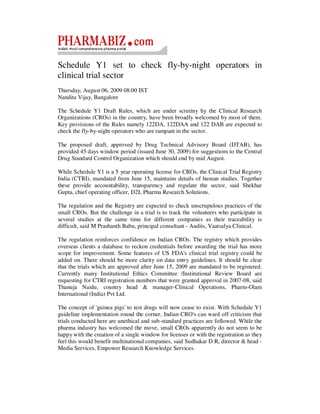Schedule Y1 set to check fly-by-night operators in clinical trial sector
- 1. Schedule Y1 set to check fly-by-night operators in clinical trial sector Thursday, August 06, 2009 08:00 IST Nandita Vijay, Bangalore The Schedule Y1 Draft Rules, which are under scrutiny by the Clinical Research Organizations (CROs) in the country, have been broadly welcomed by most of them. Key provisions of the Rules namely 122DA, 122DAA and 122 DAB are expected to check the fly-by-night operators who are rampant in the sector. The proposed draft, approved by Drug Technical Advisory Board (DTAB), has provided 45 days window period (issued June 30, 2009) for suggestions to the Central Drug Standard Control Organization which should end by mid August. While Schedule Y1 is a 5 year operating license for CROs, the Clinical Trial Registry India (CTRI), mandated from June 15, maintains details of human studies. Together these provide accountability, transparency and regulate the sector, said Shekhar Gupta, chief operating officer, D2L Pharma Research Solutions. The regulation and the Registry are expected to check unscrupulous practices of the small CROs. But the challenge in a trial is to track the volunteers who participate in several studies at the same time for different companies as their traceability is difficult, said M Prashanth Babu, principal consultant - Audits, Vaatsalya Clinical. The regulation reinforces confidence on Indian CROs. The registry which provides overseas clients a database to reckon credentials before awarding the trial has more scope for improvement. Some features of US FDA's clinical trial registry could be added on. There should be more clarity on data entry guidelines. It should be clear that the trials which are approved after June 15, 2009 are mandated to be registered. Currently many Institutional Ethics Committee /Institutional Review Board are requesting for CTRI registration numbers that were granted approval in 2007-08, said Thanuja Naidu, country head & manager-Clinical Operations, Pharm-Olam International (India) Pvt Ltd. The concept of 'guinea pigs' to test drugs will now cease to exist. With Schedule Y1 guideline implementation round the corner, Indian CRO's can ward off criticism that trials conducted here are unethical and sub-standard practices are followed. While the pharma industry has welcomed the move, small CROs apparently do not seem to be happy with the creation of a single window for licenses or with the registration as they feel this would benefit multinational companies, said Sudhakar D R, director & head - Media Services, Empower Research Knowledge Services.
- 2. Indian clinical research industry is valued at Rs 1000 crore. Of the 200 CROs only a handful are visible. These include Quintiles, Siro Pharma, Veeda, Clinigene, Neeman, Icon, GSK, Novartis, Eli Lily, Ecron Acunova, Lotus Labs, Vimta, GVK Biosciences, Clinigene, the Biocon subsidiary. Almost 80 percent of the outsourced assignments in clinical research is information technology related where Accenture, TCS, Cognisant, Infosys are chipping in their expertise. This is followed by Bio-analytical and Bioequivalence (BA/BE) studies, data management and patient recruitment. Among the Indian CROs Siro Pharma is the largest followed by Veeda and Ecron Manipal in terms of revenues, stated sources. Link : http://www.pharmabiz.com/article/detnews.asp?articleid=51060§ionid

